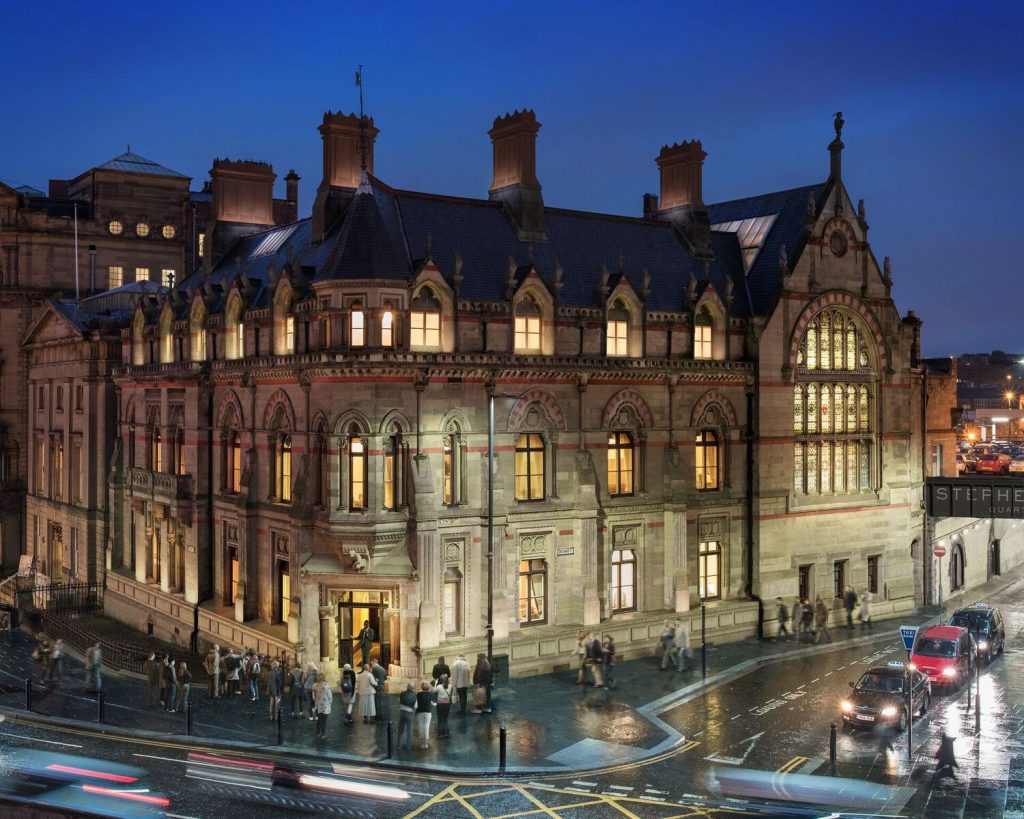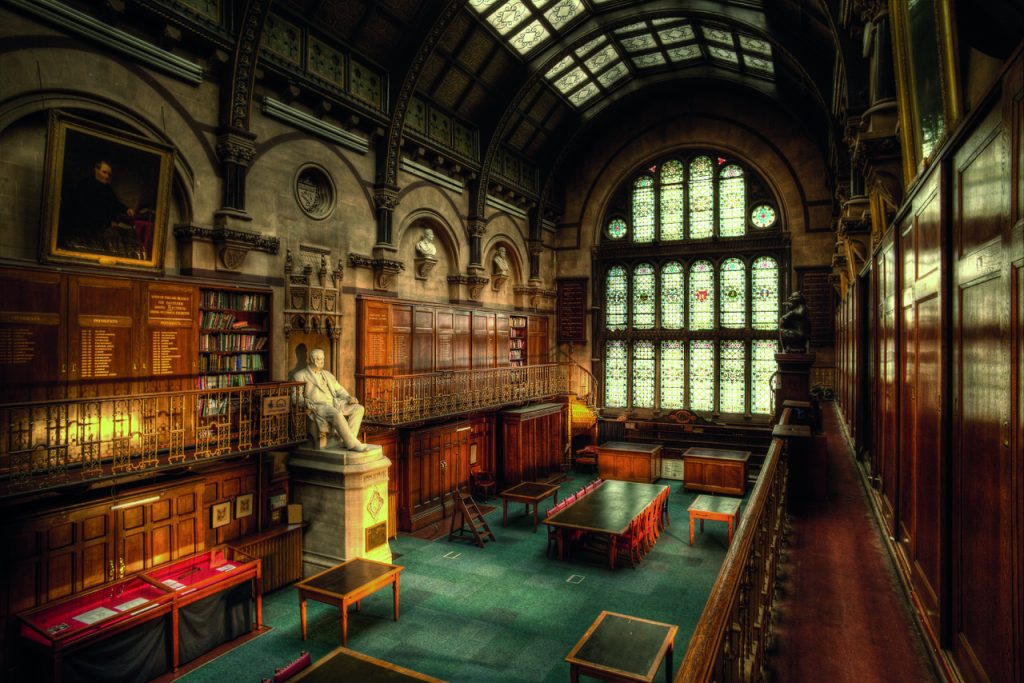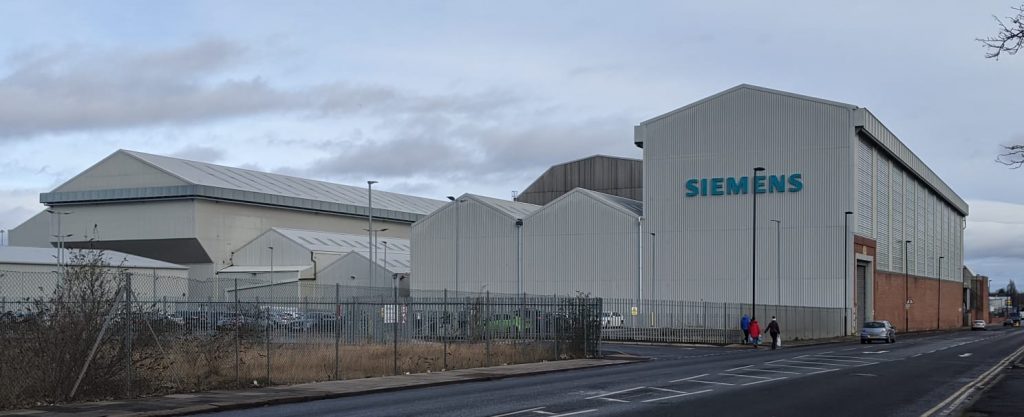The Common Room of the Great North was established in 2017 to manage the redevelopment and refurbishment of The North of England Institute of Mining and Mechanical Engineers in Newcastle. The group was awarded £4.1m from The National Lottery Heritage Fund, plus a further £3m in match funding, to conserve the Grade II* listed building, refurbish its ground floor reading rooms, securely house its archive and collections and enhance its conferencing facilities. In this Lug post, Programme and Engagement Manager Emily Tench discusses the history of the building, its collections, and the future ambitions of The Common Room.
‘There is no finality in science’. This statement was given by Nicholas Wood in 1852 to the members of the newly formed North of England Institute of Mining and Mechanical Engineers, its implications are as pertinent today as then. Innovation is constant, and industry is forever changing and adapting to meet the needs of future technological requirements. It is this engineering spirit, inspired by the founding presidents of the Institute, that we are working to capture to shape The Common Room of the Great North’s first Oral History Archive.

The Institute’s presidents and members are synonymous with North East engineering. Their skills and expertise were applied across the country and their knowledge was exported across the globe. Influential members such as Nicholas Wood, the engineer responsible for the technical drawings of George Stephenson’s Safety Lamp and Robert Stephenson, the eminent civil engineer and son to the ‘Father of Railways’, created an engineering hub of professionals within the heart of Newcastle. Thus, the Institute has amassed a treasure trove of industrial documentation to explain and preserve the engineering principles used by these industrial giants. But what has been lost in this process of documenting almost 200 years of engineering innovation and tradition? I can’t help but wonder how fascinating it would have been if someone could have recorded their voices!

The Institute’s more recent members have carried on contributing to engineering regionally, nationally and globally. Their stories of how industry has transitioned over time with the addition of modern technology and automation are one, if not the most important, assets to our project. The power in their stories lie within their passion for their region’s intangible heritage that has not always been recognised or shared. It is this heritage that is at risk of being lost for future engineering generations if it is not captured now.
Today, The Common Room has been generously funded by The National Lottery Heritage Fund with a grant of £4.1m, as part of a £7.1m project to restore our Grade II* listed building in Newcastle, preserve our historic archive and to revitalise our approach to heritage engagement. We are currently working with a wide representation of engineers covering a range of engineering disciplines from across the region. The Common Room’s oral history project; Our Voices, is working in partnership with Dr Andy Clark from the Oral History Collective to capture the voices of engineers’ past and present.

But why? Why is this so important to capture these voices? As industry continually transitions, it is important to record these changes and the impact that it has on the shape of our region’s societal, industrial and economic needs. From the mechanical apprentices to the Quality engineers, these experiences are vital in giving an in depth insight into what engineering is like today, instilling pride and showcasing the North East’s innovative spirit. The practice of oral history will enable The Common Room to capture, share and preserve personal first-hand accounts of industrial transitions, the impact of deindustrialisation and the passion for past and current innovation on the North East workforce. In doing so, we can use the archive to map how industry has changed over the last century within our region specifically and to showcase what industry is doing today.
The industrial landscape looks extremely different today than it did even 20 years ago. There are no miners going to work in the pits to mine coal, there are no ships being built at the end of your street in the docks adoring the Tyne; but industry is still alive and continues to provide jobs and engineer the world for a better tomorrow.
At The Common Room, we use our heritage to inspire the next generation of innovators and engineers to strengthen our region’s role in innovation and economic development. The oral histories captured throughout this project are vital and are having a direct impact on supporting us to achieve our mission. Not only will these memories be stored within our internationally recognised archive but they will be celebrated in a permanent exhibition space within the soon to be restored Neville Hall, our Grade II* listed building in the heart of Newcastle, in the hope that curious listeners will be inspired to become the next link in our region’s engineering chain.


We should continue promoting our selves as the Great North historically and socially.
Born in Newcastle and when married and raised a family in Chester le street .
The amount of work and co-operation that is helping , working and sharing within our communities should also be well documented
for 20/20 . We are a region that should continue to be who we are Great Northerners! .
This is a fascinating post and a brilliant initiative. I am interested in volunteering to do an oral history interview to contribute to the project. Is there any way I can get involved? Thanks
Hello Henry. If you would like to get involved in volunteering and to find out more about our opportunities please do get in touch with me at emily.tench@thecommonroom.org.uk Best wishes, Emily
I am 71 and I worked as secretary in civil engineering at Newcastle university for many years.